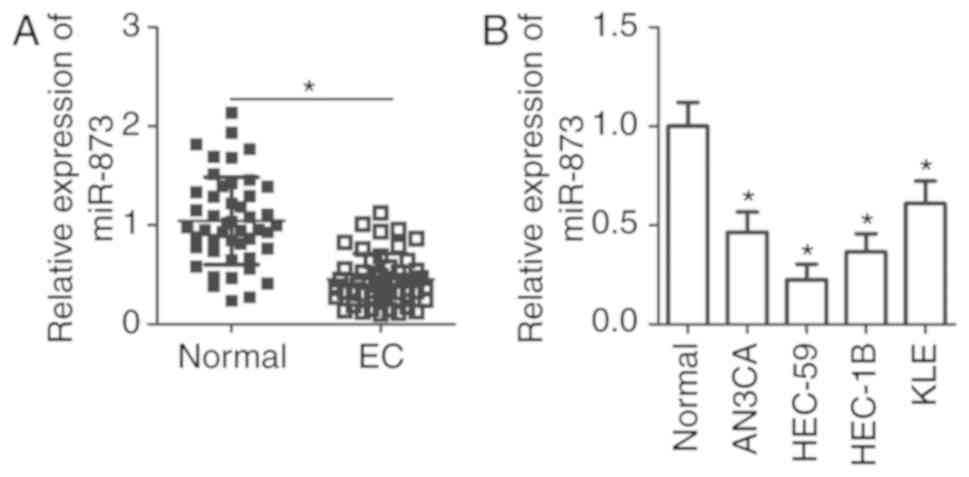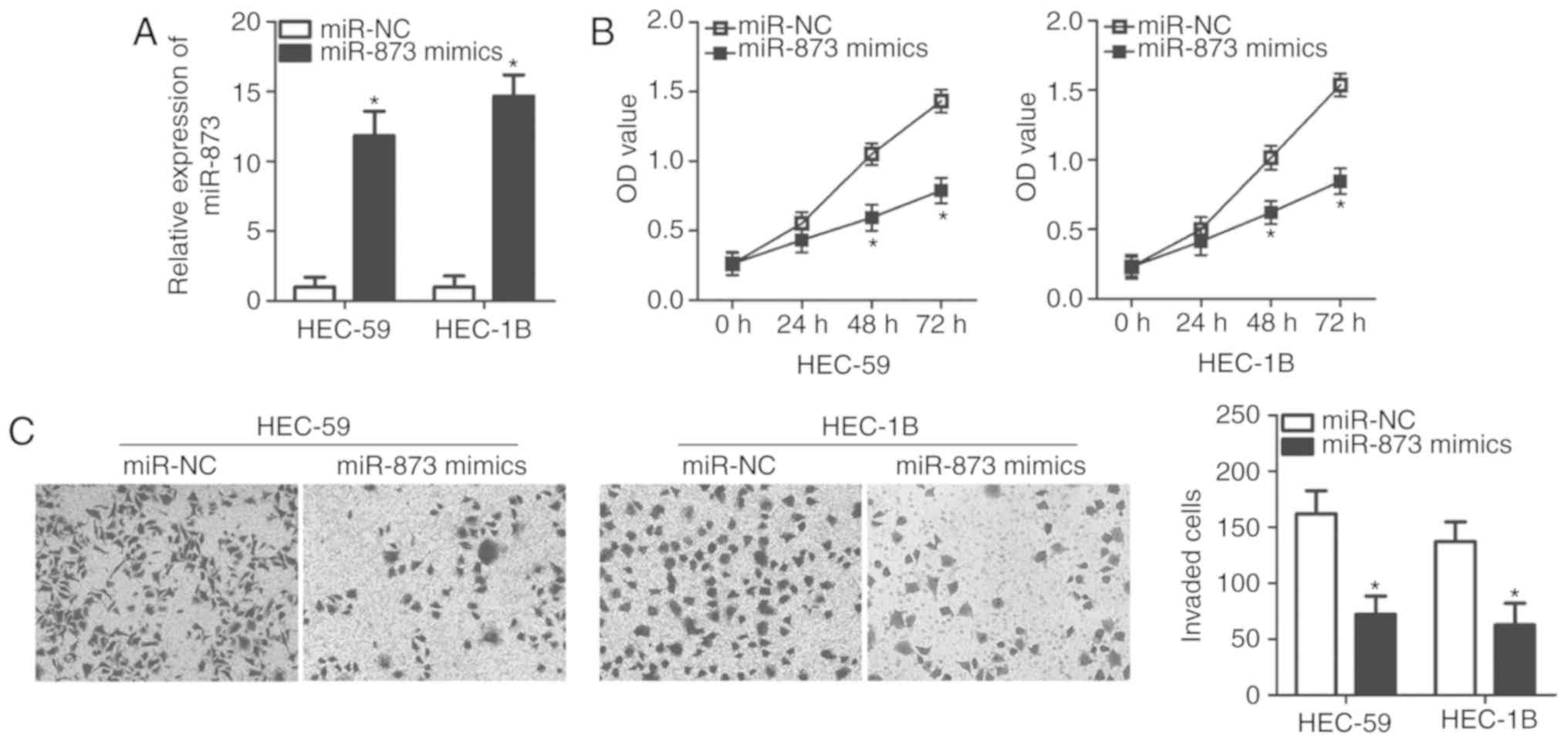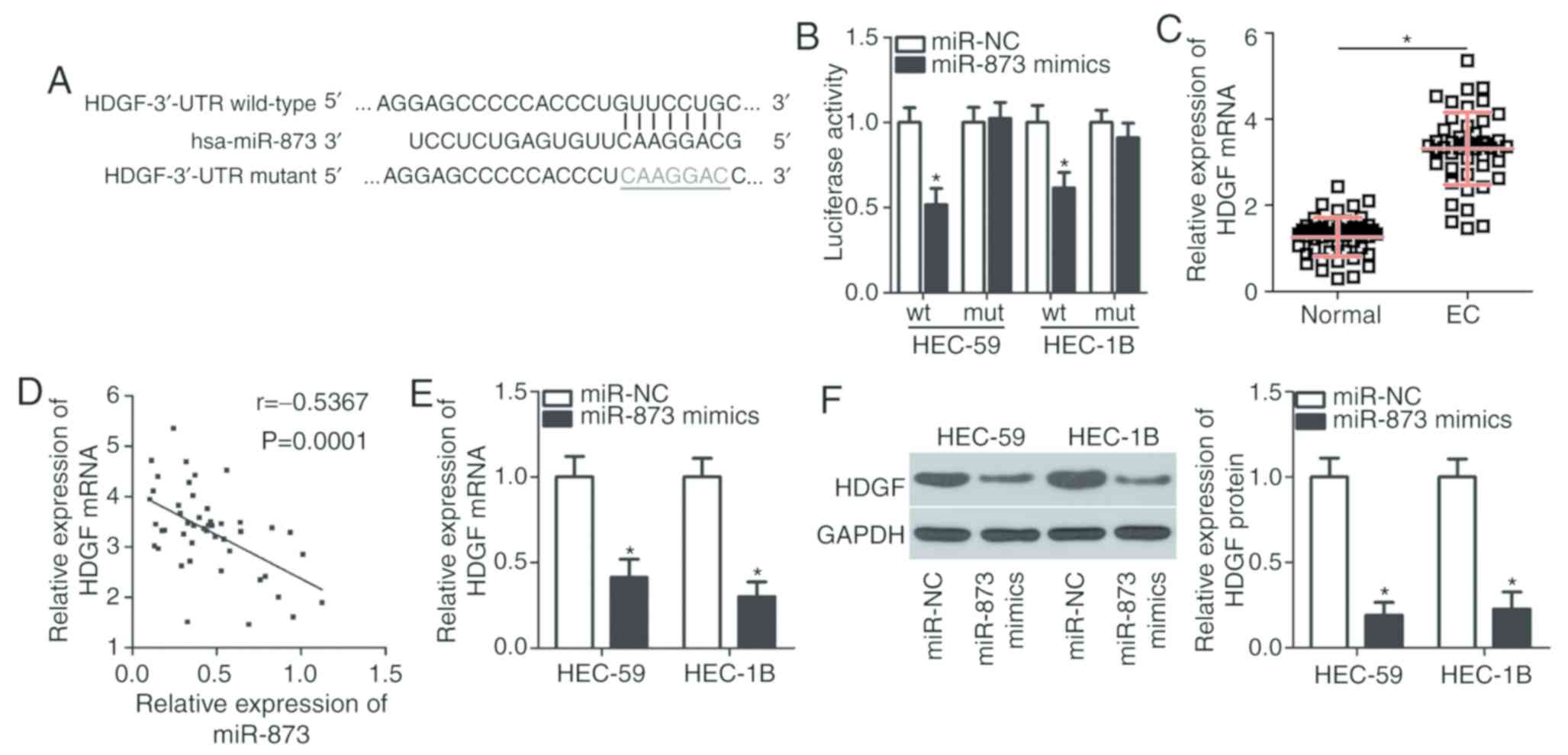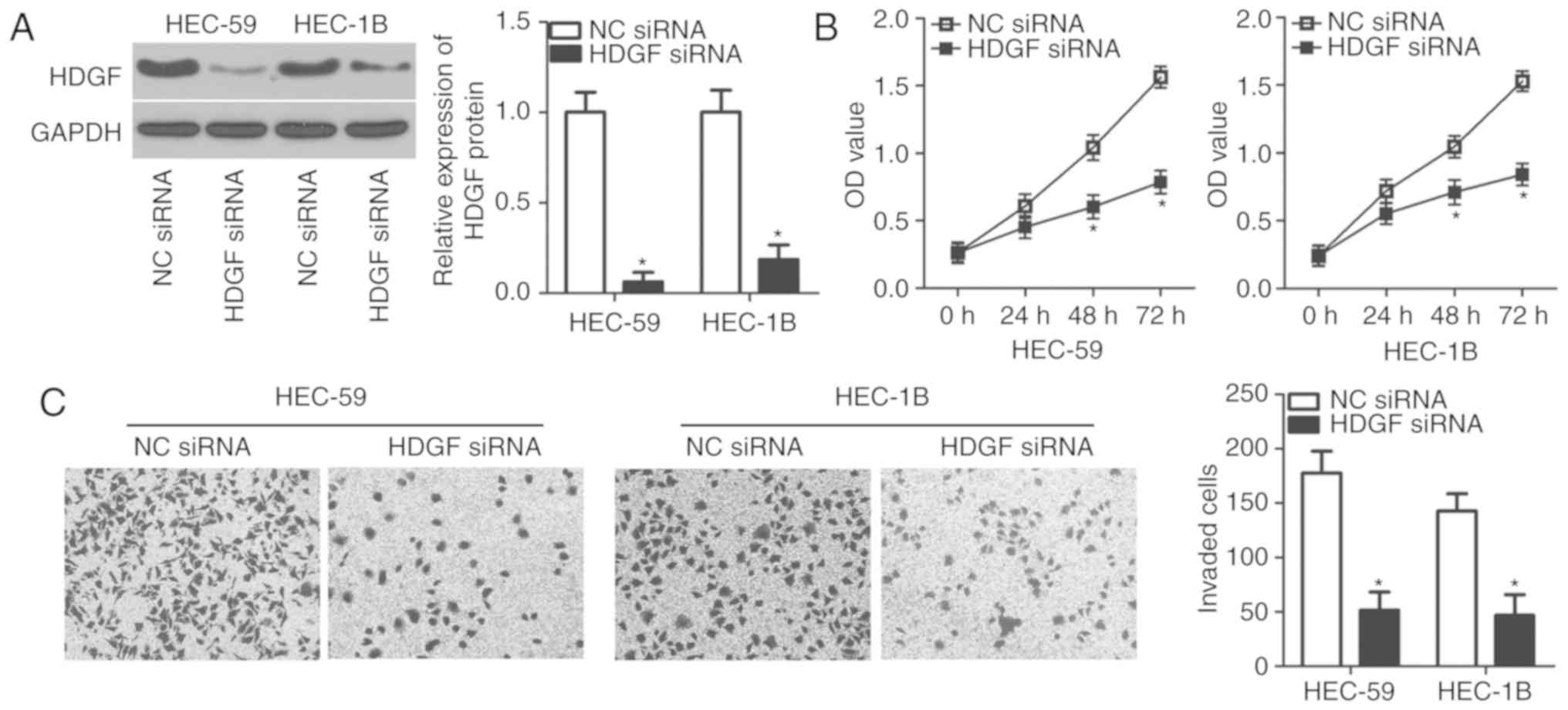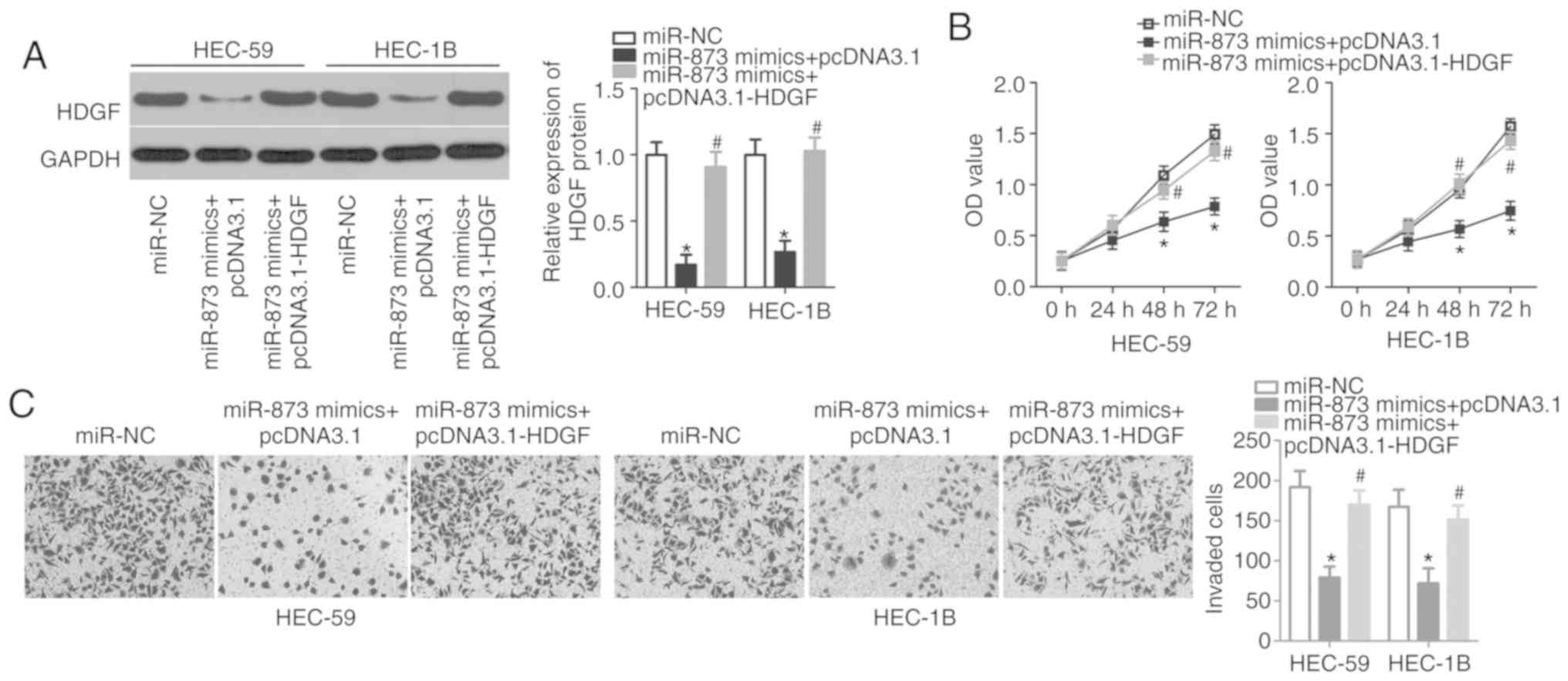|
1
|
Torre LA, Bray F, Siegel RL, Ferlay J,
Lortet-Tieulent J and Jemal A: Global cancer statistics, 2012. CA
Cancer J Clin. 65:87–108. 2015. View Article : Google Scholar : PubMed/NCBI
|
|
2
|
Dizon DS: Treatment options for advanced
endometrial carcinoma. Gynecol Oncol. 117:373–381. 2010. View Article : Google Scholar : PubMed/NCBI
|
|
3
|
Bendifallah S, Ballester M and Darai E:
Endometrial cancer: Predictive models and clinical impact. Bull
Cancer. 104:1022–1031. 2017.(In French). View Article : Google Scholar : PubMed/NCBI
|
|
4
|
Fong P and Meng LR: Effect of mTOR
inhibitors in nude mice with endometrial carcinoma and variable
PTEN expression status. Med Sci Monit Basic Res. 20:146–152. 2014.
View Article : Google Scholar : PubMed/NCBI
|
|
5
|
Vale CL, Tierney J, Bull SJ and Symonds
PR: Chemotherapy for advanced, recurrent or metastatic endometrial
carcinoma. Cochrane Database Syst Rev. CD0039152012.PubMed/NCBI
|
|
6
|
Boll D, Verhoeven RH, van der Aa MA,
Pauwels P, Karim-Kos HE, Coebergh JW and van Doorn HC: Incidence
and survival trends of uncommon corpus uteri malignancies in the
Netherlands, 1989–2008. Int J Gynecol Cancer. 22:599–606. 2012.
View Article : Google Scholar : PubMed/NCBI
|
|
7
|
Calin GA and Croce CM: MicroRNA signatures
in human cancers. Nat Rev Cancer. 6:857–866. 2006. View Article : Google Scholar : PubMed/NCBI
|
|
8
|
Lai EC: Micro RNAs are complementary to
3′UTR sequence motifs that mediate negative post-transcriptional
regulation. Nat Genet. 30:363–364. 2002. View Article : Google Scholar : PubMed/NCBI
|
|
9
|
Filipowicz W, Bhattacharyya SN and
Sonenberg N: Mechanisms of post-transcriptional regulation by
microRNAs: Are the answers in sight? Nat Rev Genet. 9:102–114.
2008. View
Article : Google Scholar : PubMed/NCBI
|
|
10
|
Chen S, Sun KX, Liu BL, Zong ZH and Zhao
Y: MicroRNA-505 functions as a tumor suppressor in endometrial
cancer by targeting TGF-α. Mol Cancer. 15:112016. View Article : Google Scholar : PubMed/NCBI
|
|
11
|
Link A and Kupcinskas J: MicroRNAs as
non-invasive diagnostic biomarkers for gastric cancer: Current
insights and future perspectives. World J Gastroenterol.
24:3313–3329. 2018. View Article : Google Scholar : PubMed/NCBI
|
|
12
|
Piasecka D, Braun M, Kordek R, Sadej R and
Romanska H: MicroRNAs in regulation of triple-negative breast
cancer progression. J Cancer Res Clin Oncol. 144:1401–1411. 2018.
View Article : Google Scholar : PubMed/NCBI
|
|
13
|
Kushlinskii NE, Fridman MV and Braga EA:
Molecular mechanisms and microRNAs in osteosarcoma pathogenesis.
Biochemistry (Mosc). 81:315–328. 2016. View Article : Google Scholar : PubMed/NCBI
|
|
14
|
Rarani FZ, Borhani F and Rashidi B:
Endometrial pinopode biomarkers: Molecules and microRNAs. J Cell
Physiol. 233:9145–9158. 2018. View Article : Google Scholar : PubMed/NCBI
|
|
15
|
Srivastava SK, Ahmad A, Zubair H, Miree O,
Singh S, Rocconi RP, Scalici J and Singh AP: MicroRNAs in
gynecological cancers: Small molecules with big implications.
Cancer Lett. 407:123–138. 2017. View Article : Google Scholar : PubMed/NCBI
|
|
16
|
Kanekura K, Nishi H, Isaka K and Kuroda M:
MicroRNA and gynecologic cancers. J Obstet Gynaecol Res.
42:612–617. 2016. View Article : Google Scholar : PubMed/NCBI
|
|
17
|
Han G, Zhang L, Ni X, Chen Z, Pan X, Zhu
Q, Li S, Wu J, Huang X and Wang X: MicroRNA-873 promotes cell
proliferation, migration, and invasion by directly targeting TSLC1
in Hepatocellular carcinoma. Cell Physiol Biochem. 46:2261–2270.
2018. View Article : Google Scholar : PubMed/NCBI
|
|
18
|
Gao Y, Xue Q, Wang D, Du M, Zhang Y and
Gao S: miR-873 induces lung adenocarcinoma cell proliferation and
migration by targeting SRCIN1. Am J Transl Res. 7:2519–2526.
2015.PubMed/NCBI
|
|
19
|
Jin S, He J, Li J, Guo R, Shu Y and Liu P:
MiR-873 inhibition enhances gefitinib resistance in non-small cell
lung cancer cells by targeting glioma-associated oncogene homolog
1. Thorac Cancer. 9:1262–1270. 2018. View Article : Google Scholar : PubMed/NCBI
|
|
20
|
Livak KJ and Schmittgen TD: Analysis of
relative gene expression data using real-time quantitative PCR and
the 2(-Delta Delta C(T)) method. Methods. 25:402–408. 2001.
View Article : Google Scholar : PubMed/NCBI
|
|
21
|
Wang L, Jiang Q, Hua S, Zhao M, Wu Q, Fu
Q, Fang W and Guo S: High nuclear expression of HDGF correlates
with disease progression and poor prognosis in human endometrial
carcinoma. Dis Markers. 2014:2987952014. View Article : Google Scholar : PubMed/NCBI
|
|
22
|
Yanokura M, Banno K, Iida M, Irie H, Umene
K, Masuda K, Kobayashi Y, Tominaga E and Aoki D: MicroRNAS in
endometrial cancer: Recent advances and potential clinical
applications. EXCLI J. 14:190–198. 2015.PubMed/NCBI
|
|
23
|
Iqbal MA, Arora S, Prakasam G, Calin GA
and Syed MA: MicroRNA in lung cancer: Role, mechanisms, pathways
and therapeutic relevance. Mol Aspects Med. 2018.(Epub ahead of
print). View Article : Google Scholar : PubMed/NCBI
|
|
24
|
Xiong H, Chen R, Liu S, Lin Q, Chen H and
Jiang Q: MicroRNA-183 induces epithelial-mesenchymal transition and
promotes endometrial cancer cell migration and invasion in by
targeting CPEB1. J Cell Biochem. 119:8123–8137. 2018. View Article : Google Scholar : PubMed/NCBI
|
|
25
|
Kontomanolis EN and Koukourakis MI:
MicroRNA: The potential regulator of endometrial carcinogenesis.
Microrna. 4:18–25. 2015. View Article : Google Scholar : PubMed/NCBI
|
|
26
|
Zhuo Z and Yu H: miR-205 inhibits cell
growth by targeting AKT-mTOR signaling in progesterone-resistant
endometrial cancer Ishikawa cells. Oncotarget. 8:28042–28051. 2017.
View Article : Google Scholar : PubMed/NCBI
|
|
27
|
Zhang W, Chen JH, Shan T,
Aguilera-Barrantes I, Wang LS, Huang TH, Rader JS, Sheng X and
Huang YW: miR-137 is a tumor suppressor in endometrial cancer and
is repressed by DNA hypermethylation. Lab Invest. 98:1397–1407.
2018. View Article : Google Scholar : PubMed/NCBI
|
|
28
|
Liu J, Li C, Jiang Y, Wan Y, Zhou S and
Cheng W: Tumor-suppressor role of miR-139-5p in endometrial cancer.
Cancer Cell Int. 18:512018. View Article : Google Scholar : PubMed/NCBI
|
|
29
|
Shi W, Wang X, Ruan L, Fu J, Liu F and Qu
J: MiR-200a promotes epithelial-mesenchymal transition of
endometrial cancer cells by negatively regulating FOXA2 expression.
Pharmazie. 72:694–699. 2017.PubMed/NCBI
|
|
30
|
Gong H, Fang L, Li Y, Du J, Zhou B, Wang
X, Zhou H, Gao L, Wang K and Zhang J: miR873 inhibits colorectal
cancer cell proliferation by targeting TRAF5 and TAB1. Oncol Rep.
39:1090–1098. 2018.PubMed/NCBI
|
|
31
|
Cui J, Yang Y, Li H, Leng Y, Qian K, Huang
Q, Zhang C, Lu Z, Chen J, Sun T, et al: MiR-873 regulates ERalpha
transcriptional activity and tamoxifen resistance via targeting
CDK3 in breast cancer cells. Oncogene. 34:40182015. View Article : Google Scholar : PubMed/NCBI
|
|
32
|
Wang RJ, Li JW, Bao BH, Wu HC, Du ZH, Su
JL, Zhang MH and Liang HQ: MicroRNA-873 (miRNA-873) inhibits
glioblastoma tumorigenesis and metastasis by suppressing the
expression of IGF2BP1. J Biol Chem. 290:8938–8948. 2015. View Article : Google Scholar : PubMed/NCBI
|
|
33
|
Cao D, Yu T and Ou X: MiR-873-5P controls
gastric cancer progression by targeting hedgehog-GLI signaling.
Pharmazie. 71:603–606. 2016.PubMed/NCBI
|
|
34
|
Liang Y, Zhang P, Li S, Li H, Song S and
Lu B: MicroRNA-873 acts as a tumor suppressor in esophageal cancer
by inhibiting differentiated embryonic chondrocyte expressed gene
2. Biomed Pharmacother. 105:582–589. 2018. View Article : Google Scholar : PubMed/NCBI
|
|
35
|
Wu DD, Li XS, Meng XN, Yan J and Zong ZH:
MicroRNA-873 mediates multidrug resistance in ovarian cancer cells
by targeting ABCB1. Tumour Biol. 37:10499–10506. 2016. View Article : Google Scholar : PubMed/NCBI
|
|
36
|
Liao F, Liu M, Lv L and Dong W:
Hepatoma-derived growth factor promotes the resistance to
anti-tumor effects of nordihydroguaiaretic acid in colorectal
cancer cells. Eur J Pharmacol. 645:55–62. 2010. View Article : Google Scholar : PubMed/NCBI
|
|
37
|
Chen SC, Hu TH, Huang CC, Kung ML, Chu TH,
Yi LN, Huang ST, Chan HH, Chuang JH and Liu LF: Hepatoma-derived
growth factor/nucleolin axis as a novel oncogenic pathway in liver
carcinogenesis. Oncotarget. 6:16253–16270. 2015.PubMed/NCBI
|
|
38
|
Tsai CC, Huang SC, Tai MH, Chien CC, Huang
CC and Hsu YC: Hepatoma-derived growth factor upregulation is
correlated with prognostic factors of early-stage cervical
adenocarcinoma. Int J Mol Sci. 15:21492–21504. 2014. View Article : Google Scholar : PubMed/NCBI
|
|
39
|
Liu XJ, Liu WL, Yang FM, Yang XQ and Lu
XF: Hepatoma-derived growth factor predicts unfavorable prognosis
of epithelial ovarian cancer. Onco Targets Ther. 8:2101–2109.
2015.PubMed/NCBI
|















